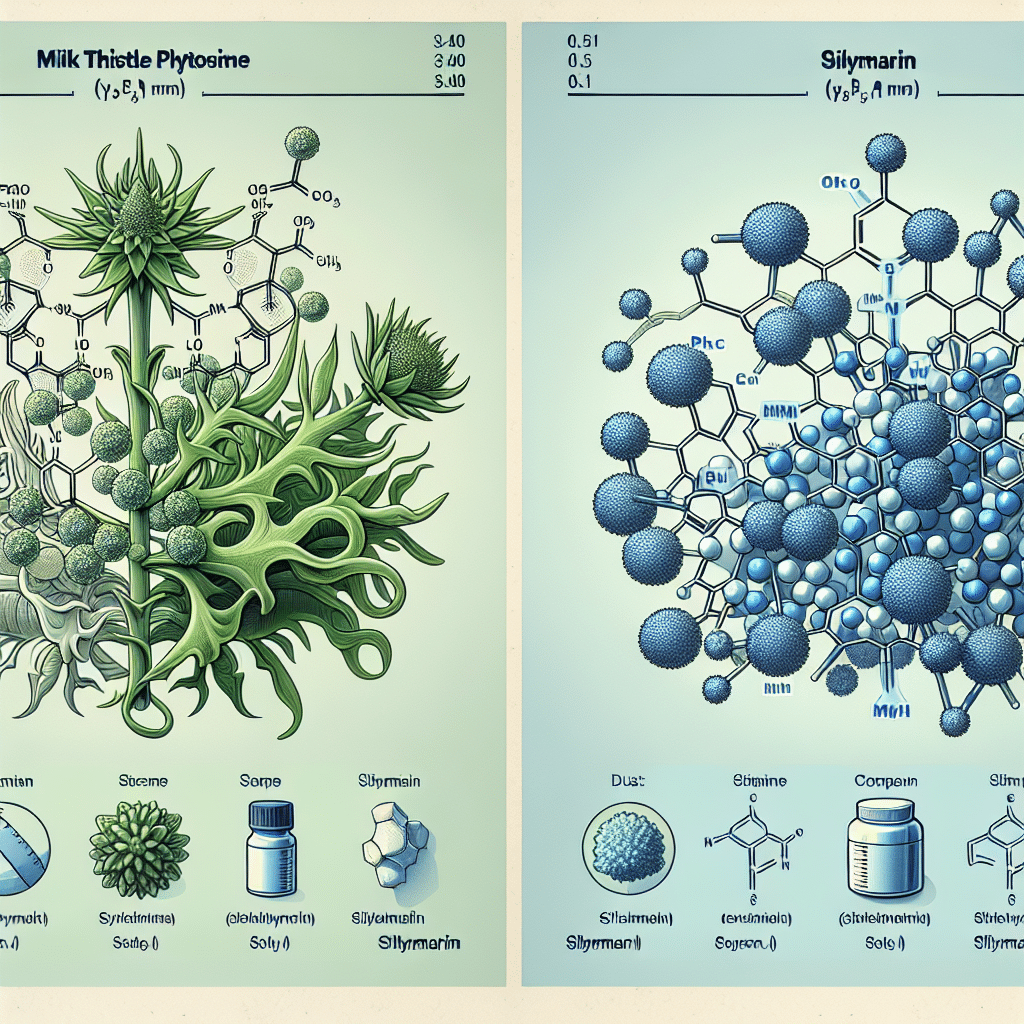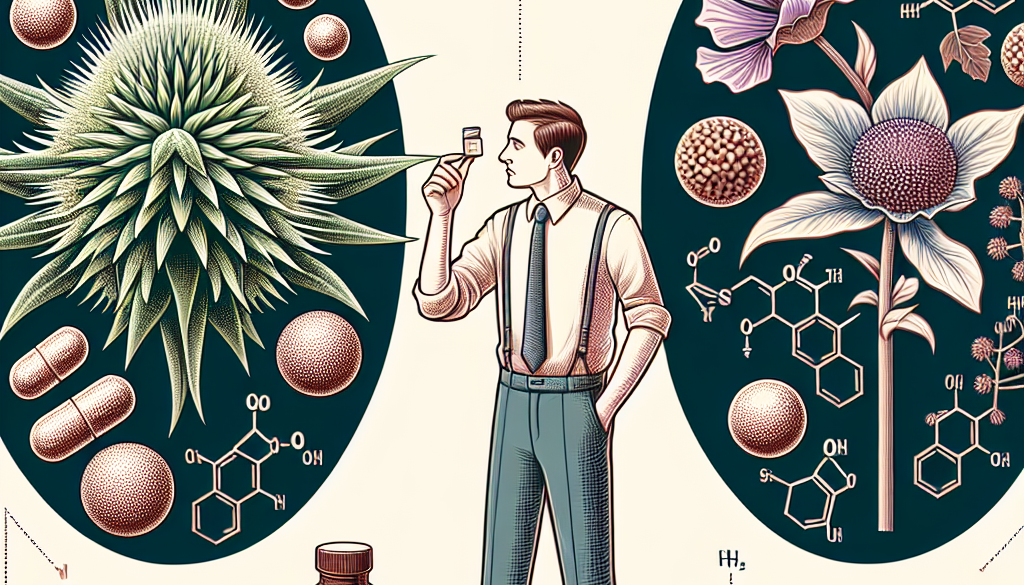Milk Thistle Phytosome vs Silymarin: Comparison
-
Table of Contents
- Milk Thistle Phytosome vs Silymarin: In-Depth Comparison
- Understanding Milk Thistle and Silymarin
- What is Silymarin?
- Introduction to Milk Thistle Phytosome
- Comparing Bioavailability: Phytosome vs Standard Extracts
- Efficacy in Liver Health and Beyond
- Case Studies and Research Findings
- Choosing the Right Supplement
- Conclusion: Key Takeaways
- Explore ETchem’s Protein Products
Milk Thistle Phytosome vs Silymarin: In-Depth Comparison

Milk thistle has been a staple in traditional medicine for centuries, primarily for its liver-protecting effects. The active compound in milk thistle, silymarin, has been extensively studied and is known for its antioxidant and anti-inflammatory properties. However, the emergence of milk thistle phytosome technology has introduced a new player in the field of herbal supplements. This article delves into the differences between milk thistle phytosome and silymarin, examining their efficacy, bioavailability, and potential health benefits.
Understanding Milk Thistle and Silymarin
Milk thistle (Silybum marianum) is a plant native to Mediterranean countries. It has been used for over 2,000 years as a natural remedy for liver and gallbladder disorders. The seeds of the milk thistle plant contain a group of compounds collectively known as silymarin. Silymarin itself is a mixture of flavonolignans, including silybin, silydianin, and silychristin, with silybin being the most active and abundant component.
What is Silymarin?
Silymarin is traditionally extracted from milk thistle seeds and is widely available as a dietary supplement. It is known for its hepatoprotective properties, meaning it helps protect the liver from toxins. Silymarin has been used to treat liver diseases such as cirrhosis, jaundice, hepatitis, and gallbladder disorders. Its antioxidant properties help to reduce free radical production and oxidative stress, which can damage liver cells.
Introduction to Milk Thistle Phytosome
Milk thistle phytosome is a form of milk thistle extract that is bound to phosphatidylcholine, a key component of lecithin. This process creates a complex where the silymarin is surrounded by a lipid layer, which enhances its absorption and bioavailability. The term “phytosome” refers to the specific process of binding a botanical extract to a phospholipid to improve its delivery to the body’s tissues.
Comparing Bioavailability: Phytosome vs Standard Extracts
One of the main challenges with silymarin is its poor solubility in water, which leads to low bioavailability when taken orally. This means that only a small percentage of the active compounds are absorbed into the bloodstream, reducing its effectiveness. The phytosome technology addresses this issue by increasing the lipophilic nature of silymarin, allowing it to pass more easily through the lipid-rich cell membranes in the digestive tract.
- Standard Silymarin Extracts: Typically have low bioavailability due to poor water solubility.
- Milk Thistle Phytosome: Demonstrates significantly higher bioavailability, ensuring more of the active compounds reach the bloodstream.
Efficacy in Liver Health and Beyond
Both milk thistle phytosome and standard silymarin extracts are used for their liver-protective effects. However, due to the enhanced bioavailability of the phytosome form, it may offer more potent benefits. Studies have shown that milk thistle phytosome can help regenerate liver tissue, protect against liver-damaging substances like alcohol and certain medications, and improve liver function in individuals with liver diseases.
Moreover, the increased absorption of silymarin in the phytosome form may also amplify its other health benefits, such as:
- Supporting healthy cholesterol levels
- Reducing insulin resistance in people with type 2 diabetes
- Improving skin health and providing anti-aging effects
Case Studies and Research Findings
Several studies have compared the effects of milk thistle phytosome to standard silymarin extracts. For instance, a study published in the journal “Drugs Under Experimental and Clinical Research” found that silybin-phosphatidylcholine complex (a form of milk thistle phytosome) was absorbed nearly five times better than silymarin alone. Another study in the “Journal of Clinical Pharmacology” reported improved liver function tests in patients with liver disease who took milk thistle phytosome compared to those who took non-phytosome silymarin.
Choosing the Right Supplement
When selecting a milk thistle supplement, it’s essential to consider the form and dosage. Milk thistle phytosome supplements are generally more expensive than standard silymarin extracts due to the advanced technology used in their production. However, their enhanced bioavailability may justify the higher cost for those seeking maximum therapeutic benefits.
Conclusion: Key Takeaways
In conclusion, while both milk thistle phytosome and silymarin offer liver-protective benefits, the phytosome form stands out due to its superior bioavailability and potentially greater efficacy. For individuals looking for a high-quality supplement to support liver health, milk thistle phytosome may provide a more potent option. However, as with any supplement, it’s crucial to consult with a healthcare provider before starting any new regimen, especially for those with pre-existing health conditions or taking medications.
Explore ETchem’s Protein Products
If you’re interested in enhancing your health regimen with high-quality protein products, consider exploring ETchem’s offerings. ETchem is a reputable Chinese Collagen factory manufacturer and supplier, known for its premium collagens, including marine, fish, bovine, chicken, and various types of collagen. Their products are characterized by a neutral taste and instant solubility, catering to a diverse range of industries.
ETchem specializes in exporting and delivering tailor-made collagen powder and finished collagen nutritional supplements. Their extensive product range covers sectors like Food and Beverage, Sports Nutrition, Weight Management, Dietary Supplements, Health and Wellness Products, ensuring comprehensive solutions to meet all your protein needs.
As a trusted company by leading global food and beverage brands and Fortune 500 companies, ETchem reinforces China’s reputation in the global arena. For more information or to sample their products, please contact them and email karen(at)et-chem.com today.
About ETChem:
ETChem, a reputable Chinese Collagen factory manufacturer and supplier, is renowned for producing, stocking, exporting, and delivering the highest quality collagens. They include marine collagen, fish collagen, bovine collagen, chicken collagen, type I collagen, type II collagen and type III collagen etc. Their offerings, characterized by a neutral taste, instant solubility attributes, cater to a diverse range of industries. They serve nutraceutical, pharmaceutical, cosmeceutical, veterinary, as well as food and beverage finished product distributors, traders, and manufacturers across Europe, USA, Canada, Australia, Thailand, Japan, Korea, Brazil, and Chile, among others.
ETChem specialization includes exporting and delivering tailor-made collagen powder and finished collagen nutritional supplements. Their extensive product range covers sectors like Food and Beverage, Sports Nutrition, Weight Management, Dietary Supplements, Health and Wellness Products, ensuring comprehensive solutions to meet all your protein needs.
As a trusted company by leading global food and beverage brands and Fortune 500 companies, ETChem reinforces China’s reputation in the global arena. For more information or to sample their products, please contact them and email karen(at)et-chem.com today.




